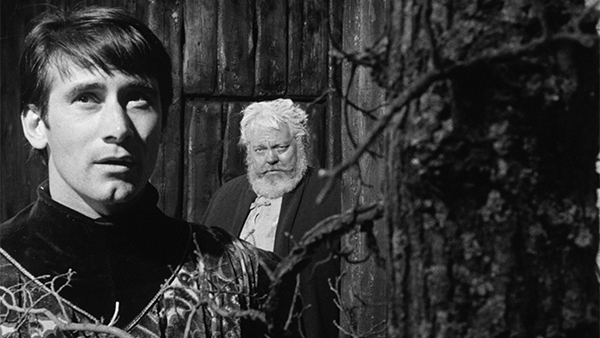The Triumphant Return of Chimes at Midnight

In March of 1967, Bosley Crowther, then the film critic for the New York Times, wrote about Orson Welles’s Chimes at Midnight, penning what is now considered one of his most famously wrong-headed reviews. “It is a big, squashy, tatterdemalion show,” wrote Crowther, “and it has no business intruding so brashly in the serious Shakespearean affairs of the Lancasters, the Percies and the Mortimers, which Mr. Welles does get to from time to time in this freely selected composite of scenes from Shakespeare, as it were.”
With that single write-up, Crowther has been credited with having largely killed the film’s prospects in the United States. Chimes, which comprises material from five of Shakespeare’s plays to tell the story of the Bard’s recurring character Sir John Falstaff, barely made it to screens upon its initial release, and in the intervening years it has been frustratingly difficult to see.
The Times eventually came around to the film in 1992, when it was scheduled for a short run at New York’s Public Theater. Vincent Canby then called it “dazzling,” with Welles in “the greatest role of his career, in which he gives his greatest performance,” and he marveled at the film’s emotional power: “Shakespeare really isn't supposed to be so moving in this day and age.” But the praise was no help—amid a dispute over rights, the scheduled two-week run was canceled on opening night. And so in the nearly fifty years since the film’s release, very few people have been able to appreciate it.
But last week Chimes finally got the release it deserved, returning to theaters in a new restoration by our partners at Janus Films, and it has been playing to packed houses in New York and Los Angeles. Today’s reviewers, citing dramatically improved picture quality and sound that renders intelligible the film’s previously muffled dialogue, are almost unanimously hailing it as one of Welles’s greatest masterpieces.
The Times also has resoundingly backed away from Crowther's initial assessment of the film—declaring on opening day of the rerelease that “if there was one role Orson Welles was born to play,” it wasn’t either of his legendary characters from The Third Man or Citizen Kane, but Falstaff, “in this sublime 1966 film mash-up, which includes a battle sequence that holds its own alongside the likes of Kurosawa and Eisenstein.”
Times change.



